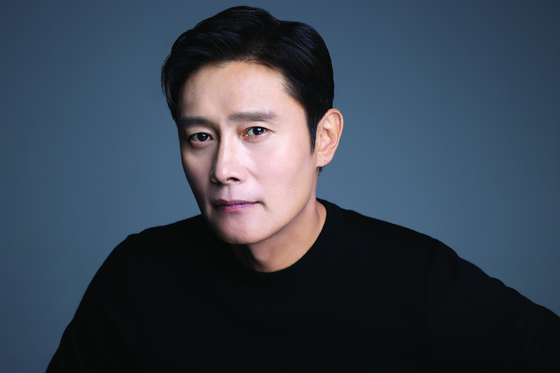Lee Byung-hun takes the lead in disaster film ‘Concrete Utopia’
![Actor Lee Byung-hun [BH ENTERTAINMENT]](https://koreajoongangdaily.joins.com/data/photo/2023/08/01/84cbd72a-4c87-42d4-902c-21613dd5d745.jpg)
Actor Lee Byung-hun [BH ENTERTAINMENT]
Veteran actor Lee Byung-hun has been receiving the same question for the last 15 years: Does he feel pressured by his fame and talent?
Lee says his answer is always the same: Everyday, and more so when there’s a new piece to be shown — like this week, when there was a press preview on Monday followed by a group interview on Tuesday for the new disaster-film-turned-black-comedy, “Concrete Utopia.”
“I really look forward to the day when I won’t feel such pressure,” he said.
“I keep thinking to myself, ‘How much better of an actor do I need to become to stop receiving this question?’ And I think no matter how famous or revered you become, that pressure will always follow you.”
![Yeong-tak, played by actor Lee Byung-hun, leads the residents of Imperial Palace Apartment against "outsiders" in "Concrete Utopia" [LOTTE ENTERTAINMENT]](https://koreajoongangdaily.joins.com/data/photo/2023/08/01/23454206-1454-4abd-a171-b61c0cfab858.jpg)
Yeong-tak, played by actor Lee Byung-hun, leads the residents of Imperial Palace Apartment against “outsiders” in “Concrete Utopia” [LOTTE ENTERTAINMENT]
In “Concrete Utopia,” Lee plays Yeong-tak, a man who becomes the leader of the residents of Imperial Palace Apartment, the only building in Seoul that is not turned to rubble by a devastating earthquake that wipes out most of the city. Yeong-tak mobilizes the apartment residents against the “outsiders” who do not live at the complex, before a surprising secret about Yeong-tak himself is revealed in the later part of the film.
“Concrete Utopia” is based on the second part of a webtoon by Kim Sung-nik titled, “Pleasant Bullying” (2014-16). When Lee first received the script for the film, he said, he was instantly hooked.
“My character Yeong-tak is someone who seems very ordinary, carrying with him ordinary worries, depression and a sense of having given up,” Lee said. “Then he is suddenly thrust into this power and position after the earthquake and becomes the leader of Imperial Palace Apartment. It was interesting to depict this character and the changes that he goes through, to the final revelation of his secret.”
Lee, most famous for roles in classic hit films such as “Joint Security Area” (2000), “A Bittersweet Life” (2005) and “The Good, the Bad, the Weird” (2008) and in dramas such as “Masquerade” (2012) and “Mr. Sunshine” (2018), said he still has some doubts about his own acting.
![Main poster for ″Concrete Utopia″ [LOTTE ENTERTAINMENT]](https://koreajoongangdaily.joins.com/data/photo/2023/08/01/b0109fec-016f-4826-9059-6ce294e1f12a.jpg)
Main poster for ″Concrete Utopia″ [LOTTE ENTERTAINMENT]
“I still feel a bit insecure sometimes in my acting when I see it on the big screen,” Lee said. “Especially with the dramatic scenes, because a character’s emotions when they are extreme can be interpreted in a lot of different ways by the viewer.”
“The story of a single apartment remaining intact after an earthquake and people gathering at that place to try to survive was very intriguing,” Lee said. “And I think the story is one about humanity and how far people would go for their own interests. The people of Imperial Palace Apartment struggle with their own survival and the advance of the outsiders. What would happen to each of us if such an event took place?”
There is one particular scene near the end of the movie in which Lee performs a kind of dance and sings, which is metaphorically important for the overall film. This was Lee’s favorite scene from the upcoming film and one of the hardest to film.
“That scene is interwoven with flashbacks that reveals Yeong-tak’s secret, so it was a very important scene to film,” Lee said. “We took many takes with it and discussed among the cast, director and crew how to execute it. I think that by that scene Yeong-tak has had a taste of power and his desire for power grows in a grotesque way, and that’s expressed through that critical scene.”
Apartments pose a special meaning for Koreans especially, in the context of the rapid development of Korean society and the class divide that housing systems embody. This is why Lee believes Korean viewers will relate to the film more, while foreigners will be able to learn about the psychology of Koreans.
“Koreans have a unique relationship with apartments because of the significance of owning one’s own home and the economic meaning of apartments,” Lee said. “I think foreign viewers may have to dig into the story of ‘Concrete Utopia’ to find these references.”
“Concrete Utopia,” opens on Aug. 9.
BY LIM JEONG-WON [lim.jeongwon@joongang.co.kr]




















